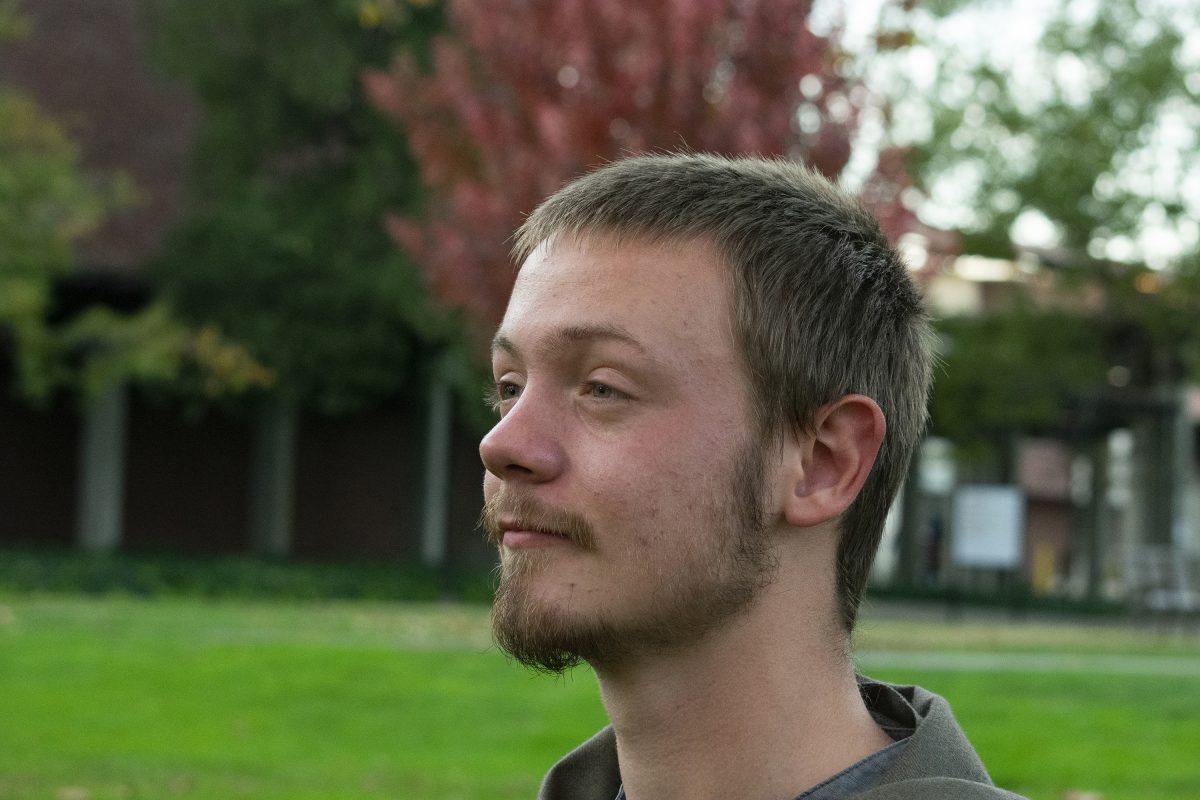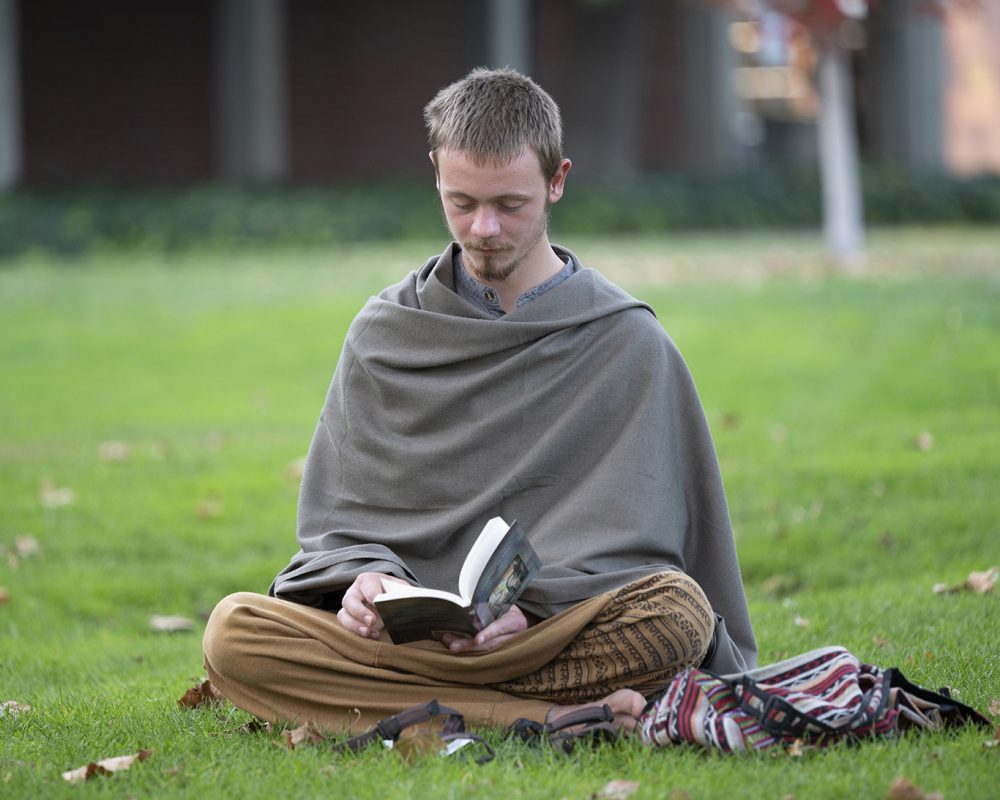Aaron Heim lived in Pomona and attended classes regularly at California State Polytechnic University. Despite being a productive student, Heim said he faced challenges maintaining his mental health because he turned to drugs to escape his responsibilities.
“The real decline came when I had a girlfriend for six months, and she told me she had [a] fiancé,” said Heim, now a City College student. “So I started asking myself, ‘How this could have gone unnoticed? Where was I? What was keeping me from realizing any of this?’”
Heim returned to Sacramento four months ago, which is also when he decided to take control of his mental health by meditating. In the past, he saw a licensed therapist but felt it wasn’t for him, and this led someone to suggest that he meditate. Heim also reads, gardens, likes to teach and learn from people around him and stopped using drugs, all of which he said help his state of mind, too.
“Meditation helped me to realize how dilapidated my own mind was and helped me to develop my own philosophies and ideas after I had cleaned up my own thoughts,” said Heim.

Sometimes it takes more than a strong will to restore mental health. According to the Substance Abuse and Mental Health Services Administration, 43.3% of adults who experienced mental disorders received care services in 2018.
At City College, every academic counselor is trained to provide crisis intervention when a student walks into the counseling department in need of support, said counselor Shannon Gilley, and the department has four designated crisis counselors to help on any given day.
“Counselors see students for not just academics, but we serve students in crisis, students who have questions or concerns about career,” said Gilley. “We are here for students in general.”
Gilley said that City College also now has an on-campus therapist, Meghan Lefkowitz, to whom academic counselors can refer students. Lefkowitz’s services are free and help students develop positive coping skills aimed to support their academic success and emotional wellbeing.
“I think we do see a lot of students at midterm time and at finals time,” said Gilley. “And that seems to be when the stress increases and we get triggered, and then other things kind of domino effect.”
Students who wish to meet with Lefkowitz can schedule an appointment with a counselor and request a referral, or they can just walk into the counseling center and ask to see a counselor for personal reasons.
“Sometimes it’s just a moment like you’re just struggling with a class,” said Gilley. “But sometimes it’s a lot of other things are going on. So Meghan is our therapist, and Meghan can do very short-term therapy.”
However, Gilley said that students should understand that Lefkowitz acts as a bridge to help with mental health and that students should look for further resources outside of school and for support in their communities.
Lefkowitz said that when she meets with students, she helps them develop positive coping skills like mindfulness and grounding tools that help students to access their situation.
“We’re going to try to minimize this [stigma around mental illness] and develop some sort of activities to work on breaking the stigma,” said Lefkowitz.
One of those activities this semester was the Wellness Festival. City College received funding designated for mental health and created the festival, according to Health Educator Monika Aldabe. She also said that Health Services wants to continue finding ways to ensure students’ well being in the future by opening a wellness center in the space in Rodda Hall north formerly occupied by the Omoja and Puente programs, now located in the Cultural Awareness Center.
“We’re also really excited to talk more about mental health,” said Aldabe. “I think there’s still a stigma around it, so we really want to work to bring down that stigma for mental health on campus and open up that conversation.”
Aldabe also said that there’s no expected date for the opening of the wellness center, but that it will have information on meditation and mental health, yoga mats to loan and self-care apps. The center will also hold periodic wellness workshops in which students can learn positive coping skills for stress, depression and anxiety.
According to City College’s National Alliance of Mental Illness (NAMI) club President Brie Elise, being educated about and noticing the warning signs of mental health issues is important to support one’s own mental health as well as to help others.
“I had a friend that committed suicide, and it left an impact on my life because it made me think about what more could I have done,” said Elise. “She had a boyfriend, a new car, she was in school. There was nothing that was a telltale sign of her doing that.”
Elise said NAMI is a nonprofit organization that provides support groups for veterans, people dealing with alcoholism, mental health and even provides training for people who want to support their peers in a time of crisis.
NAMI wants to create peer support groups on campus, according to Elise, including a project for De-Stress Fest, an event that will be hosted by the Student Leadership and Development during finals week, called “Break the Wall,” where students can help create and knock down murals about mental health issues to symbolize breaking the stigma around them.
“I think being open and not hiding things that you’re dealing with actually allows you to process and heal, rather than bubbling it up inside,” said Elise. “I wanted to create a space on campus where we can advocate for students that are dealing with mental health issues.”
City College student Indi Vaughn-Ralston said she was diagnosed with bipolar disorder, as well as physical visual processing disorder, which she said exacerbates her condition because it changes how she sees what’s in front of her.
Vaughn-Ralston has found a variety of tools to help her: making a schedule to help remember when to finish a task or to take a break, having a friend or family member to talk to, and, most importantly, she said, exercising, maintaining a proper diet and sleep, and seeing her therapist.
“You know, the only thing I have to say is having a challenge or being different, it doesn’t make you any less or greater than anyone else,” said Vaughn-Ralston. “You can still accomplish everything that other people can accomplish. You just have to do it slightly differently.”
Gilley said that she encourages students who need help to go to the counseling area in Rodda Hall North 147 or schedule an appointment with a counselor. They can also request a session with Lefkowitz.
Otherwise, off-campus resources for people struggling with mental health can be found on City College’s Health Services page, which include both the Sacramento County Hotline Number and national line; the Sacramento LGBT community center and therapy centers, such as the University of Phoenix’s Counseling or Turning Point Mental Health’s urgent care centers, and many more.





























